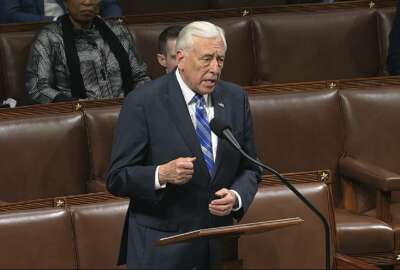
Inspectors general on shaky ground after fast dismissals
Could all of this have a chilling effect on the willingness of other agencies to issue unflattering reports?
Best listening experience is on Chrome, Firefox or Safari. Subscribe to Federal Drive’s daily audio interviews on Apple Podcasts or PodcastOne.
Rapid-fire changes in the ranks of big agency inspectors general by the Trump White House have good government and oversight groups rattled. And there’s still no Senate-confirmed IG for the pandemic relief oversight. Could all of this have a chilling effect on the willingness of other agencies to issue unflattering reports? And for some perspective, Federal Drive with Tom Temin turned to the founding partner of the Federal Practice Group, Debra D’Agostino.
Interview transcript:
Tom Temin: Debra, good to have you back.
Debra D’Agostino: Good to be here.
Tom Temin: First of all, let’s review the legal basis of inspectors general. They are in fact, either appointed by the president or by the agency head. It varies from agency to agency. But therefore they do serve at the political whim, I guess you will or at the whim of the president, correct?
Debra D’Agostino: Yeah, so the Inspector General Reform Act of 2008 was supposed to de-politicize this whole process of appointing and firing IGs. So under that act, the appointments were supposed to be made by the president without regard to the political affiliation. And then you know, what’s tricky now is that the new law said that IG’s can be removed by the president. And the only requirement is that the president communicate the reason to Congress 30 days before the removal. So there’s no for-cause requirement or anything like that, requiring anything other than notice to Congress for the president to do what he’s been doing.
Tom Temin: So basically, then there’s nothing anybody can do about these except complain. I’m not saying they’re right or wrong but legally, just from the strictly legal standpoint, is the administration in the right, with respect to all of these, I guess there’s five or six or seven IGs that have been removed?
Debra D’Agostino: I don’t think anyone would say he’s in the right. But he’s also just toeing that line between legal and illegal. You know, obviously, right now, Congress is flapping their arms, they want to look into this. There does seem to be some inspector generals that were removed for, well, I guess all the five recent ones from removed for what seems like inappropriate reasons. But again, there is no cause requirement. And the district court in D.C. actually already held in a case that took place under the Obama administration, that the law doesn’t set out any specific criteria. So whether it’s right or wrong, technically, yes, it is legal for Trump to be doing what he’s doing.
Tom Temin: So basically, the other administrations have done it but perhaps not in the manner or frequency or volume that this administration has?
Debra D’Agostino: Right. I think what’s so jarring about this is this is all sort of coming off the heels of the end of the impeachment trial where Trump removed Lt. Col. Vindman from the White House, Ambassador Sondland, and both of those seemed very blatantly to be retaliation for their testimony during the impeachment trial. Again, both of those moves were things that nobody could do much about other than get upset about it and talk about it. But because those seemed so retaliatory in nature, and this was coming, you know, even though it seems like a lifetime ago, it’s actually only a few short weeks later that these five removals have come. They all seem to be based in some sort of either retaliation, or just an attempt to stop the IG from doing what they’re doing at the agency.
Tom Temin: We’re speaking with Debra D’Agostino, she is the founding partner of the Federal Practice Group. And there is one strange situation, I believe it’s at the Transportation Ddepartment, where now the acting IG is also a program manager there, which would seem to set up a classic conflict of interest, which I don’t think the original IG act or the reform one really envisioned or intended, correct?
Debra D’Agostino: Certainly not. I mean, the idea was that this IG is somebody who’s separate and apart from any agency programs and who really does serve in an independent capacity as a watchdog. So you know, at Transportation Department – there’s been also taught at the State Department – the acting IG that’s been put in place in place of the removed IG is someone who has direct control over a program. And so how could it be appropriate for an inspector general to be looking into their own program? That certainly isn’t independent or neutral.
Tom Temin: And there’s also the question of how much work one person can oversee. I think the acting defense IG is also the EPA inspector general.
Debra D’Agostino: Right. Yeah, I mean, I think this administration has used these acting officials in a capacity that we’ve never ever seen before. And that’s also true for the IGs. And so we’ve got people acting in capacities that set up conflicts, or just make the person unable to serve as they should be.
Tom Temin: Yeah, I was going to say what do you feel is the roll-up effect of all of this right now on the IG community, on oversight and on good government?
Debra D’Agostino: Well, I think it’s pretty jarring. I think the IGs have to have received the message that if they do what it is they’re charged to do under the law, they’re likely to be removed. And so, you know, I think there’s probably a whole lot of consternation about how to act if you’re an IG. And then also, I think there has to be a tremendous chilling effect on whistleblowers. Traditionally, whistleblowers often went to the Office of Inspector General at their agency, as an, you know, a first stop to see if the problem could be resolved. And I just think, given the air of retaliation that’s been put out there, whistleblowers have to be more concerned about sticking their neck out again, especially after what happened during the impeachment trial and the sort of villainization of the whistleblower that occurred there.
Tom Temin: Sure. And now there is a bill just out I think, maybe late last week from the House Democratic leadership, that would restrict the reasons by which an administration could review an IG. It would have to be malfeasance or gross negligence or misuse of funds, that kind of thing. I guess the question is, does that have any chance of passing, and is it really constitutional?
Debra D’Agostino: Well, I think the idea of adding a for-cause requirement is certainly something to be looked at. I think the problem is, you know, what body determines if the clause was appropriate? I mean, do you have Congress with its thumb over the president to decide if the president’s discretion was abused or not? It really creates a very untenable situation. So you know, there is also talk about removing this authority from the president. I mean, it could be placed with something like the Council of the Inspectors General. You know, there could be some sort of board stood up to evaluate the president’s reasons or the other removing authority, something to actually make it apolitical as opposed to what we’re looking at right now.
Tom Temin: But that would likely be challenged, I think, in court, and it’s not clear to me anyways, that that even though it sounds good – I mean, it’s probably not a bad idea – but it may not hold up under a constitutional microscope.
Debra D’Agostino: I think it is going to be problematic to have you know one branch overseeing the other branch in this manner. There’s certainly room for reform. If you go back and look at what happened in 2008, the whole focus was on making sure that the IGs were acting in an apolitical manner and weren’t political figures. And there wasn’t really consideration into the president abusing this as a political tool or to achieve his political objectives or even, you know, what’s going on at some agencies to put a shine on some things that maybe would be embarrassing otherwise. So it just wasn’t the circumstance wasn’t really contemplated when the Reform Act was debated back in 2008. So I mean, there’s certainly plenty of room for debate on how to reform the situation.
Tom Temin: Debra D’Agostino is founding partner of the Federal Practice Group. As always, thanks so much for joining me.
Debra D’Agostino: Glad to be here again.
Tom Temin: We’ll post this interview at www.FederalNewsNetwork.com/FederalDrive. Hear the Federal Drive on demand and on your device. Subscribe at Apple Podcasts or Podcastone.
Copyright © 2025 Federal News Network. All rights reserved. This website is not intended for users located within the European Economic Area.
Tom Temin is host of the Federal Drive and has been providing insight on federal technology and management issues for more than 30 years.
Follow @tteminWFED
Related Stories




